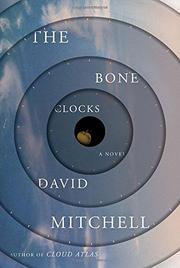


THE BONE CLOCKS
by David Mitchell
Mitchell’s latest could have been called The Rime of the Ancient Marinus—the “youthful ancient Marinus,” that is. Another exacting, challenging and deeply rewarding novel from logophile and time-travel master Mitchell (Cloud Atlas, 2004, etc.).
As this long (but not too long) tale opens, we’re in the familiar territory of Mitchell’s Black Swan Green (2006)—Thatcher’s England, that is. A few dozen pages in, and Mitchell has subverted all that. At first it’s 1984, and Holly Sykes, a 15-year-old suburban runaway, is just beginning to suss out that it’s a scary, weird place, if with no shortage of goodwilled protectors. She wants nothing but to get away: “The Thames is riffled and muddy blue today, and I walk and walk and walk away from Gravesend towards the Kent marshes and before I know it, it’s 11:30 and the town’s a little model of itself, a long way behind me.” Farther down the road, Holly has her first inkling of a strange world in which “Horologists” bound up with one Yu Leon Marinus and, well, sort-of-neo-Cathars are having it out, invited into Holly’s reality thanks to a tear in her psychic fabric. Are they real? As one strange inhabitant of a “daymare” asks, “But why would two dying, fleeing incorporeals blunder their way to you, Holly Sykes?” Why indeed? The next 600 pages explain why in a course that moves back and forth among places (Iceland, Switzerland, Iraq, New York), times and states of reality: Holly finds modest success in midlife even as we bone clocks tick our way down to a society of her old age that will remind readers of the world of Sloosha’s Crossin’ from Cloud Atlas: The oil supply has dried up, the poles are melting, gangs roam the land, and the old days are a long way behind us. “We live on,” says an ever unreliable narrator by way of resigned closing, “as long as there are people to live on in.”
If Thatcher’s 1984 is bleak, then get a load of what awaits us in 2030. Speculative, lyrical and unrelentingly dark—trademark Mitchell, in other words.